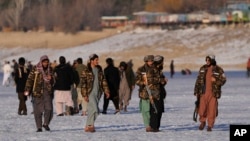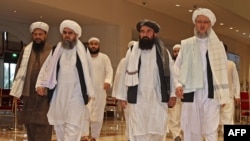Afghanistan’s hardline Islamic rulers say they plan to “reconsider” their policy towards the United States if the administration of President Joe Biden refuses to return the full $7 billion in assets that have been frozen in the United States.
President Biden issued an executive order last Friday calling on banks to set aside $3.5 billion of the frozen assets in a trust fund slated for humanitarian assistance in Afghanistan. The remaining $3.5 billion would stay in the United States to finance payments from lawsuits by U.S. victims of terrorism, specifically the September 11, 2001 attacks on Washington, D.C. and New York City, that are still working their way through the courts.
A spokesman for the Taliban issued a statement Monday saying the September 11 attacks “had nothing to do with Afghanistan.” The spokesman said if the United States “does not deviate from its position and continues its provocative actions, the Islamic Emirate will also be forced to reconsider its policy towards the country,” referring to Afghanistan’s official name.
The Taliban ruled Afghanistan at the time of September 11 attacks, and harbored Osama bin Laden, the head of the al Qaida terrorist network and mastermind of the U.S. attacks. A U.S.-led invasion of Afghanistan weeks after the attacks overthrew the Taliban after they refused Washington’s demands to surrender bin Laden.
The U.S. withdrawal from Afghanistan last August ended the nearly 20-year war, but the United Nations and other international relief groups say Afghanistan faces one of the world’s worst humanitarian crises, which stems from more than four decades of conflict and natural calamities.
More than half of the country’s poverty-stricken population, or an estimated 24 million Afghans, face an acute food shortage and some one million children under five years of age could die from hunger by the end of this year, according to U.N. estimates following the U.S. withdrawal from the country.
Some information for this report came from Reuters and Agence France-Presse.






